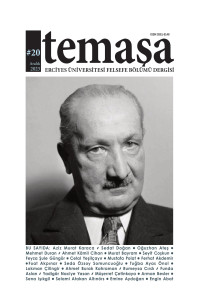Abstract
Çalışmamızda, Ethica’nın V. Bölümünün 23. Önermesinin merkezinde yer aldığı zihnin/ruhun ölümsüzlüğü/sonsuzluğu başlıkları altında tartışılan önermeler kümesini inceleyeceğiz. ‘Önermeler kümesi’nden kastımız; V,20-23 ve V,29-31 arasındaki önermelerin kanıtlamaları, sonuçları ve notları olacaktır. Gerçekleştirmeye çalıştığımız bu inceleme iki bölümden oluşmaktadır: i) yakın okuma yöntemiyle V,23 ve önerme kümesi ele alınacak ve ii) literatürde nasıl tartışıldığını göstereceğiz. İlk bölümde söz konusu önermenin analizini yaparken, sadece metnin içinde kalarak, Spinoza’nın bu önermesini anlamak için sorunu ebediyet kavramı merkezinde sonsuzluk-zamansallık gerilimini öne sürerek ele alacağız. Makalenin ikinci bölümünde, literatürden örneklerle önermenin nasıl tahlil edildiğini betimleyecek ve bu yorumların ışığında büyük güçlük yaratan bu sorunun çözüm zeminini açığa çıkaracağız. Burada öne çıkan bazı yorumlardan hareketle sorunun ölümsüzlük olmadığını iddia ettikten sonra, Spinoza’nın ebedilik kavrayışı merkezindeki okumalara geçmeyi planlıyoruz. Spinoza felsefesinde, deyim yerindeyse, bir infial yaratan V,23’ün ebedilik-zamansallık geriliminin üstünü örten okumalarla değil bilakis bu gerilim temelinde okunması gerektiğini iddia edeceğiz. Böylelikle Spinoza düşüncesinde zaman-süre ve zamansallık gibi mefhumların yeniden değerlendirilmesi gerektiğini ileri süreceğiz.
Thanks
Sayın Editör, teşekkürlerimi sunarım.
References
- Armour, L. “Knowledge, Ideas and Spinoza’s Notion of Immortality” in Spinoza: The Enduring Questions, Editör: G. Hunter, 48-64.Toronto; Buffalo: University of Toronto Press, 1994.
- Bennett, J. A Study of Spinoza’s Ethics. Indianapolis: Hackett Publishing Company, 1984.
- Curley, E. Behind the Geometrical Method: A Reading of Spinoza's Ethics. New Jersey: Princeton University Press, 1988.
- Donagan, A. “Spinoza’s Proof of Immortality” in Spinoza: A Collection of Critical Essays, Editör: Marjorie Grene, 241-58. New York: Anchor Books, 1973.
- Hardin, C.L. “Spinoza on Immortality and Time,” The Southwestern Journal of Philosophy 8, sayı: 3 (1977): 129-38.
- Kneale, M. “Eternity and Sempiternity” in Spinoza: A Collection of Critical Essays, Editör: Marjorie Grene, 223-38. New York: Anchor Books, 1973.
- Kneale, W. “Time and Eternity in Theology,” Proc. Aris. Soc 61, sayı: 1 (1961): 97-107.
- Llyod, Genevieve. “Spinoza’s Version of the Eternity of the Mind” in Spinoza and the Sciences, Editör: Marjorie Grene Debra Nails, 211-37. Boston: D. Reidel Publishing Company, 1986.
- Parchment, S. “The Mind’s Eternity in Spinoza’s Ethics,” Journal of the History of Philosophy 38, no. 3 (2000): 349-82.
- Spinoza, B. Ethica. Çeviren: A. Yardımlı, İstanbul: İdea, 2009.
- Wolfson, H.A. The Philosophy of Spinoza II. Cambrige & Massachussetts: Harvard University Press, 1934.
Abstract
In our study, we will examine the set of propositions discussed under the headings of immortality/eternity of the mind/soul, of which the 23rd Proposition of Chapter V of Ethica is at its center. What we mean by 'set of propositions' is; Propositions V,20-23 and V,29-31 will have proofs, conclusions, and notes. This article we are trying to carry out consists of two parts: i) we will discuss V,23 and the proposition set by close reading method, and ii) we will show how it is discussed in the literature. While analyzing the proposition in question in the first part, we will only stay within the text and address the problem in order to understand Spinoza's proposition by proposing the tension of eternity-temporality at the center of the concept of eternity. In the second part of the article, we will describe how the proposition was analyzed with examples from the literature and, in the light of these interpretations, we will reveal the basis for the solution of this problem, which creates great difficulty. Here, after arguing that the problem is not immortality, based on some of the interpretations that appear first, we plan to move on to readings centered on Spinoza's conception of eternity.We will claim that V,23, which creates an outrage, so to speak, in Spinoza's philosophy, should be read on the basis of this tension, not with readings that cover up the tension of eternity-temporality. Thus, we will argue that notions such as time-duration and temporality in Spinoza's thought need to be re-evaluated.
References
- Armour, L. “Knowledge, Ideas and Spinoza’s Notion of Immortality” in Spinoza: The Enduring Questions, Editör: G. Hunter, 48-64.Toronto; Buffalo: University of Toronto Press, 1994.
- Bennett, J. A Study of Spinoza’s Ethics. Indianapolis: Hackett Publishing Company, 1984.
- Curley, E. Behind the Geometrical Method: A Reading of Spinoza's Ethics. New Jersey: Princeton University Press, 1988.
- Donagan, A. “Spinoza’s Proof of Immortality” in Spinoza: A Collection of Critical Essays, Editör: Marjorie Grene, 241-58. New York: Anchor Books, 1973.
- Hardin, C.L. “Spinoza on Immortality and Time,” The Southwestern Journal of Philosophy 8, sayı: 3 (1977): 129-38.
- Kneale, M. “Eternity and Sempiternity” in Spinoza: A Collection of Critical Essays, Editör: Marjorie Grene, 223-38. New York: Anchor Books, 1973.
- Kneale, W. “Time and Eternity in Theology,” Proc. Aris. Soc 61, sayı: 1 (1961): 97-107.
- Llyod, Genevieve. “Spinoza’s Version of the Eternity of the Mind” in Spinoza and the Sciences, Editör: Marjorie Grene Debra Nails, 211-37. Boston: D. Reidel Publishing Company, 1986.
- Parchment, S. “The Mind’s Eternity in Spinoza’s Ethics,” Journal of the History of Philosophy 38, no. 3 (2000): 349-82.
- Spinoza, B. Ethica. Çeviren: A. Yardımlı, İstanbul: İdea, 2009.
- Wolfson, H.A. The Philosophy of Spinoza II. Cambrige & Massachussetts: Harvard University Press, 1934.
Details
| Primary Language | Turkish |
|---|---|
| Subjects | 17th Century Philosophy |
| Journal Section | Articles |
| Authors | |
| Publication Date | December 15, 2023 |
| Submission Date | November 17, 2023 |
| Acceptance Date | December 3, 2023 |
| Published in Issue | Year 2023 Issue: 20 |


